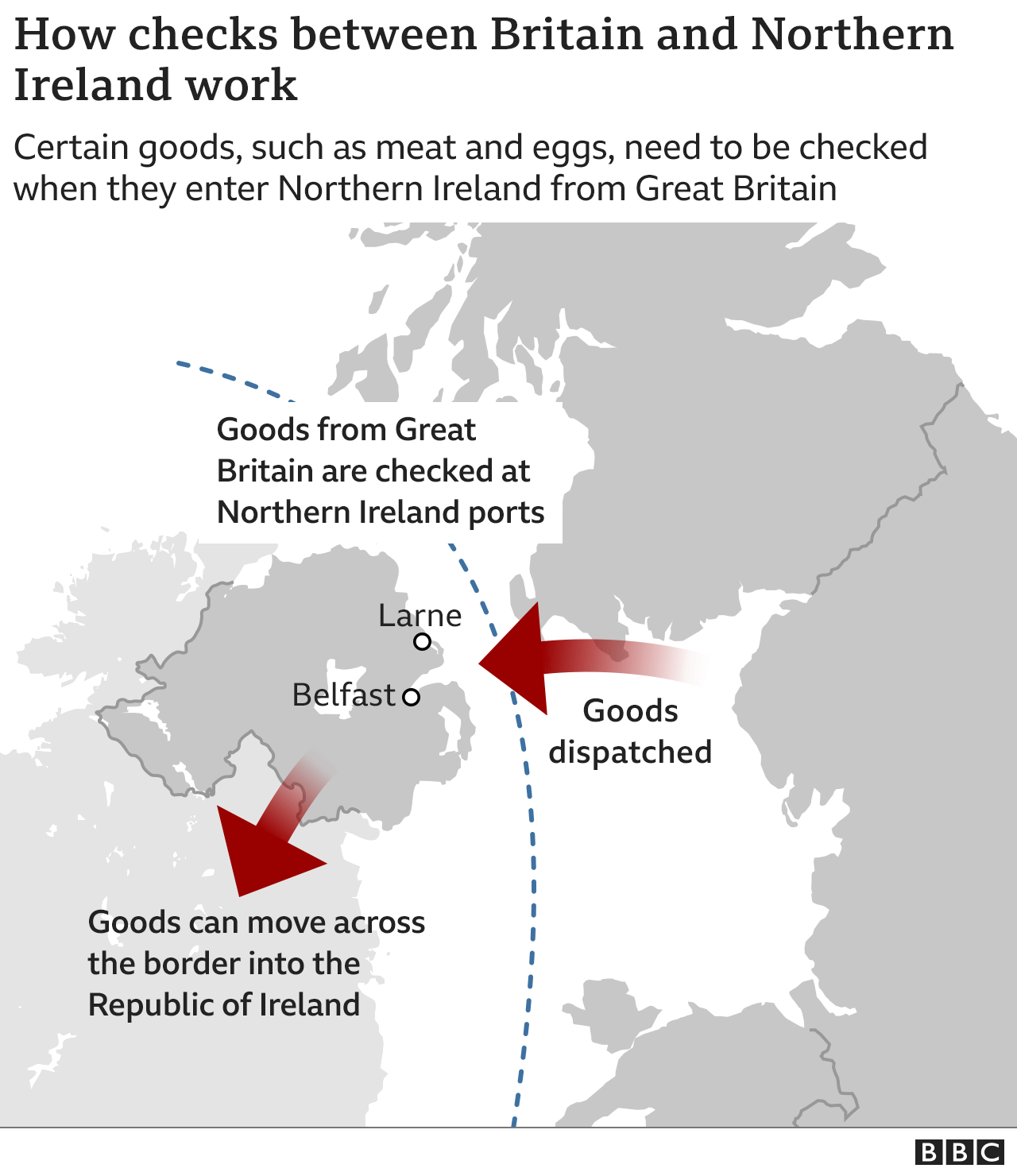BBC News 21 July 2021
 |
| Lord Frost will give an update on the Northern Ireland protocol in Parliament later |
UK ministers will outline how they want to overhaul trading arrangements between Britain and Northern Ireland that came into effect after Brexit.
The Northern Ireland Protocol helps prevent the need for checks on the island of Ireland's internal border.
But Lord Frost says the deal - which could mean a ban on exports of British chilled meat and sausages to Northern Ireland - is unfair and unsustainable.
The protocol was negotiated with the EU by Lord Frost but he is expected to say its terms need to be radically changed.
In particular, the government is worried about chilled meat products, including burgers and sausages, no longer being exportable from Great Britain (England, Scotland and Wales) to Northern Ireland, when the full terms of the deal are set to kick in at the end of September.
The UK is expected to warn the EU it is prepared to override the Brexit arrangements for Northern Ireland if a simpler agreement cannot be reached.
But it will not be triggering Article 16 of the protocol - which would allow it to suspend parts of the Brexit deal - "in the short term", a government source said.
Meanwhile, Marks & Spencer has warned there could be higher prices and less choice for its Northern Ireland customers if EU customs rules - which would mean full checks on goods coming in from Great Britain - come into force in the autumn.
During the 2019 general election campaign, shortly after his government had agreed the terms of the Northern Ireland Protocol, Boris Johnson said: "There's no question of there being checks on goods going from NI to GB (Northern Ireland to Great Britain) or GB to NI."
But it was clear at the time that the agreement itself said something different.
It sets out in detail which EU laws will continue to apply in Northern Ireland, and how EU rules on customs and agricultural food products will be enforced on goods arriving in Northern Ireland from the rest of the UK.
A series of grace periods has blunted some of these measures temporarily, but they run out in September, when checks are due to intensify.
The UK government now says the agreement it signed up to is unacceptable and is being interpreted far too inflexibly.
It wants to eliminate most of the checks on the Irish Sea trade border that the protocol created - but that would entail the EU ignoring many of the rules of its single market.
If the UK were to walk away from the protocol, the EU could suspend parts of the (separate) EU-UK trade deal which was agreed at the end of last year.
In other words, it could prompt a much wider trade dispute. And the politics would be poisonous.
The protocol was agreed to prevent the return of a hard border between the Irish Republic and Northern Ireland, as both the UK and EU want to prevent any return to the Troubles, which lasted 30 years and cost more than 3,500 lives.
Under its terms, Northern Ireland effectively remains part of the EU's single market for goods, meaning it complies with standards set by Brussels.
The biggest practical difficulty, in trade terms, concerns the movement of food from Britain to Northern Ireland, which could then be transported into the EU via the Irish land border.
Brussels says the issue could be solved if the UK agreed to follow EU food standards - known as a Swiss-style deal.
But Lord Frost says the UK is not prepared to concede control over food standards and wants what is known as an equivalence deal - where the EU would accept British standards as being as good as its own.
On Monday, the Brexit minister said the only way to make the protocol sustainable was to "find a way to hugely reduce or eliminate the barriers between Great Britain and Northern Ireland".
According to the Financial Times, he will push for an "honesty box" approach, allowing companies to declare their goods are only destined for sale and use in Northern Ireland - rather than across the EU - to exempt them from checks after crossing the Irish Sea.
Ireland's European affairs minister Thomas Byrne told BBC Radio 4's Today programme: "We're going to listen carefully to what the British government have to say.
"We're willing to discuss any creative solutions within the confines of the protocol but we have to recognise as well that Britain decided itself to leave the single market of the European Union, to apply trade rules, to apply red tape to its goods that are leaving Britain, to goods that are coming into Britain."
Unionist leaders argue the protocol damages trade and threatens Northern Ireland's place in the UK.
They have also linked tensions over it to rioting that erupted in Belfast during spring.
Northern Ireland First Minister Paul Givan said: "The evidence is clear the protocol has failed and is damaging the economy of Northern Ireland, destabilising societal cohesion and lacks democratic accountability."
Prime Minister Boris Johnson used a phone call on Tuesday with his Irish counterpart Micheal Martin to call for "pragmatism" to address the "serious challenges that have arisen with the protocol".
For Labour, Brexit spokeswoman Baroness Chapman said: "The prime minister negotiated this deal just months ago and yet today communities and businesses in Northern Ireland are being subjected to another round of brinkmanship.
"The government and the EU must urgently find a sustainable way forward to reassure everyone affected by this political stalemate."



